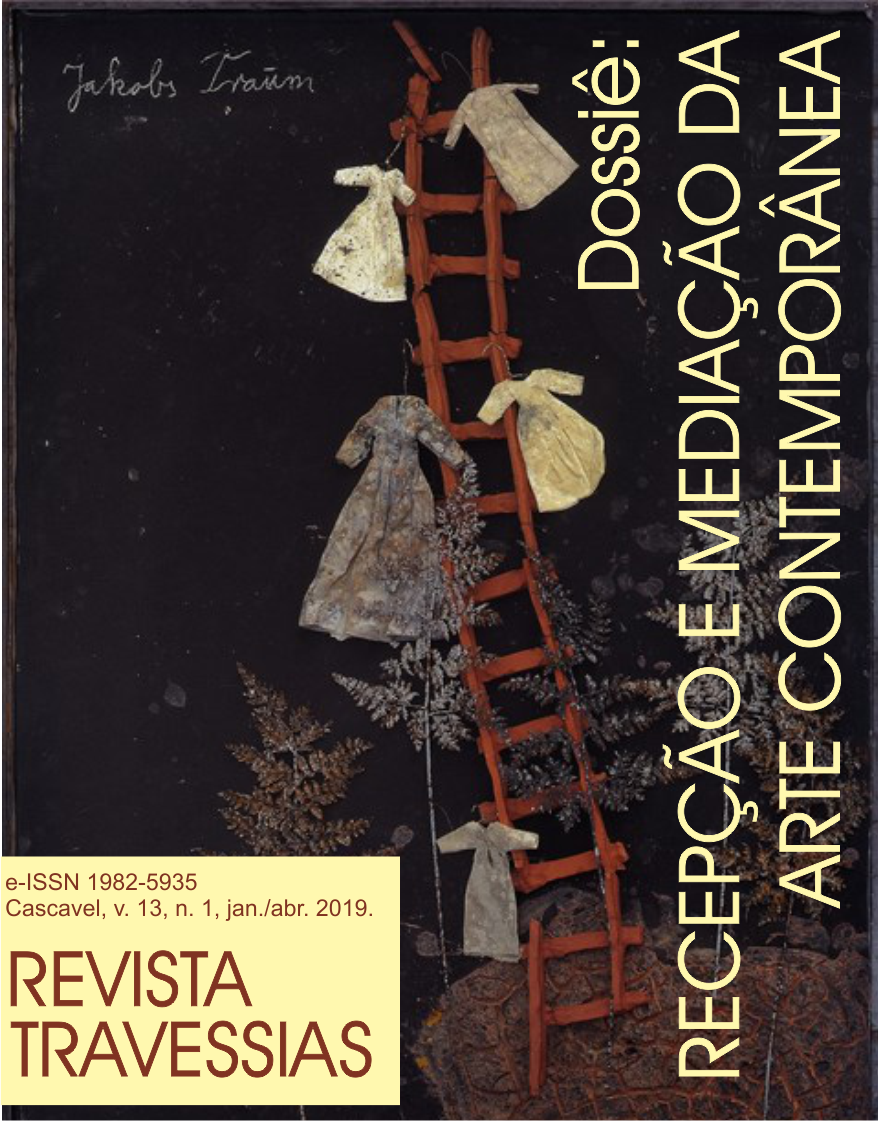Para além dos sentidos, do tempo e do espaço: o discurso de amor em duas formações discursivas
Palavras-chave:
Discurso de amor, formação discursiva, nonsense, amor eterno e infinito.Resumo
Neste trabalho, tivemos por objetivo analisar fragmentos de canções em língua inglesa e em língua portuguesa a partir da noção-conceito de formação discursiva, oriunda da Análise de Discurso de linha francesa (AD). Como pressuposto teórico-metodológico, consideramos o artigo Palavra de Amor, de Eni Orlandi (1990), como base de nossa pesquisa. Os elementos linguísticos nos versos das canções You’re my number one, Por você e Stars, fragmentos 1 a 3, permitiram-nos afirmar que tais canções se fundamentam em uma mesma formação discursiva constituinte do discurso de amor, a do nonsense. Nelas há a transcendência do “fixado no todo dia” (ORLANDI, 1990) que se faz através das declarações e descrições de fatos impossíveis ou transcendentais, que extrapolam os limites do cotidiano, da linguagem em uso convencional e ordinário. Já os fragmentos 4 a 7 são também provenientes de canções de autores, estilos e épocas distintos, mas fundamentadas em uma mesma formação discursiva, a do amor eterno e infinito. Nas canções I will always love you, Amor sem limite, Eu sei que vou te amar e Como é grande o meu amor por você o discurso de amor produz o efeito de sentido de poder extrapolar os limites do tempo e do espaço, projetando-se para além do aqui e do agora. Como resultado geral da análise, concluímos que o conceito de formação discursiva, embora muito controverso ao longo da história da AD, ainda se faz bastante produtivo.
Downloads
Referências
BARONAS, Roberto Leiser. Ainda sobre a noção-conceito de formação discursiva. In: BARONAS, Roberto Leiser. (Org.). Análise do discurso: apontamentos para uma história da noção-conceito de formação discursiva. São Carlos: Pedro & João, 2007. p. 169-181.
GADET. F; HAK, T. Por uma análise automática do discurso: uma introdução à obra de Michel Pêcheux. 3 ed. Campinas: Editora da UNICAMP, 1997.
GREGOLIN, Maria do Rosário Valencise. Formação discursiva, redes de memória e trajetos sociais de sentido: mídia e produção de identidades. In: BARONAS, Roberto Leiser (Org.). Análise do discurso: apontamentos para uma história da noção-conceito de formação discursiva. São Carlos: Pedro & João, 2007. p. 155-168.
FOUCAULT, Michel. A arqueologia do saber. Trad. Luiz Felipe Baeta Neves. 7. ed. Rio de Janeiro: Forense Universitária, 2005.
MAINGUENEAU, Dominique. Cenas da enunciação. Org. Sírio Possenti, Maria Cecília Pérez de Souza-e-Silva. São Paulo: Parábola, 2008.
ORLANDI, Eni Pulcinelli. Palavra de amor. Caderno de Estudos Linguísticos, Campinas, vol. 19, p.75-95, jul./dez, 1990.
PÊCHEUX, Michel. Semântica e discurso: uma crítica à afirmação do óbvio. Trad. Eni P. Orlandi. 3. ed. Campinas: Editora da UNICAMP, 1997.
PÊCHEUX, Michel. O discurso: estrutura ou acontecimento. Trad. Eni P. Orlandi. 3. ed. Campinas: Pontes, 2002.
SARGENTINI, Vanice Maria de Oliveira. A noção de formação discursiva: uma relação estreita com o corpus na análise do discurso. In: BARONAS, Roberto Leiser (Org.). Análise do discurso: apontamentos para uma história da noção-conceito de formação discursiva. São Carlos: Pedro & João, 2007. p. 215-222.
Downloads
Publicado
Como Citar
Edição
Seção
Licença
Aviso de Direito Autoral Creative Commons
Política para Periódicos de Acesso Livre
Autores que publicam nesta revista concordam com os seguintes termos:
1. Autores mantêm os direitos autorais e concedem à revista o direito de primeira publicação, com o trabalho simultaneamente licenciado sob a Licença Creative Commons Attribution que permite o compartilhamento do trabalho com reconhecimento da autoria e publicação inicial nesta revista.
2. Autores têm autorização para assumir contratos adicionais separadamente, para distribuição não-exclusiva da versão do trabalho publicada nesta revista (ex.: publicar em repositório institucional ou como capítulo de livro), com reconhecimento de autoria e publicação inicial nesta revista.
3. Autores têm permissão e são estimulados a publicar e distribuir seu trabalho online (ex.: em repositórios institucionais ou na sua página pessoal) a qualquer ponto antes ou durante o processo editorial, já que isso pode gerar alterações produtivas, bem como aumentar o impacto e a citação do trabalho publicado (Veja O Efeito do Acesso Livre).
Licença Creative Commons
Esta obra está licenciada com uma Licença Creative Commons Atribuição-NãoComercial-CompartilhaIgual 4.0 Internacional, o que permite compartilhar, copiar, distribuir, exibir, reproduzir, a totalidade ou partes desde que não tenha objetivo comercial e sejam citados os autores e a fonte.



